Have you ever seen a spider remain perfectly still on a wall for a long time, leading you to think it’s dead, but as soon as you go near it, it gets startled and fleas? This makes you wonder if the poor thing was sleeping.
But, wait, do spiders sleep? Spiders don’t sleep like humans or most animals do, they don’t have eyelids, and don’t close their eyes to catch some zzz. They also can’t enter the REM state. However, they do need to rest and recover to perform hunting activities. Resting also allows them to conserve energy when food is scarce.
Stick around to learn more about the sleeping habits of the eight-legged creatures!
What Happens To Spiders When They Sleep?
When spiders perform cognitively demanding tasks, their energy levels sink, and they need to rest. However, spiders don’t sleep the way we do. Instead of lowering their awareness, they “power down” by reducing their energy levels and lowering their metabolism.
This state may last a few days especially if there’s not much to eat. This is because a spider can’t afford to expend energy when it can’t compensate for it. After eating, the spider usually returns to its resting state to conserve energy because it’s hard to tell when the meal will be.
Since they don’t have eyelids, spiders can’t close their eyes, so they wake up quickly with the weakest stimuli.
Sleep patterns in spiders are somewhat opportunistic. The depth depends on the chances of food availability. They have to remain semi-conscious so that they can jump at the food when it appears. They should also look out for threats.
The properties of this resting state vary among various species. For example, web-weaving spiders, who wait for their prey to fall into a web, can rest more than those who crawl around and hunt their prey. Plus, weaving a web requires a lot of energy, which they can compensate for by resting.
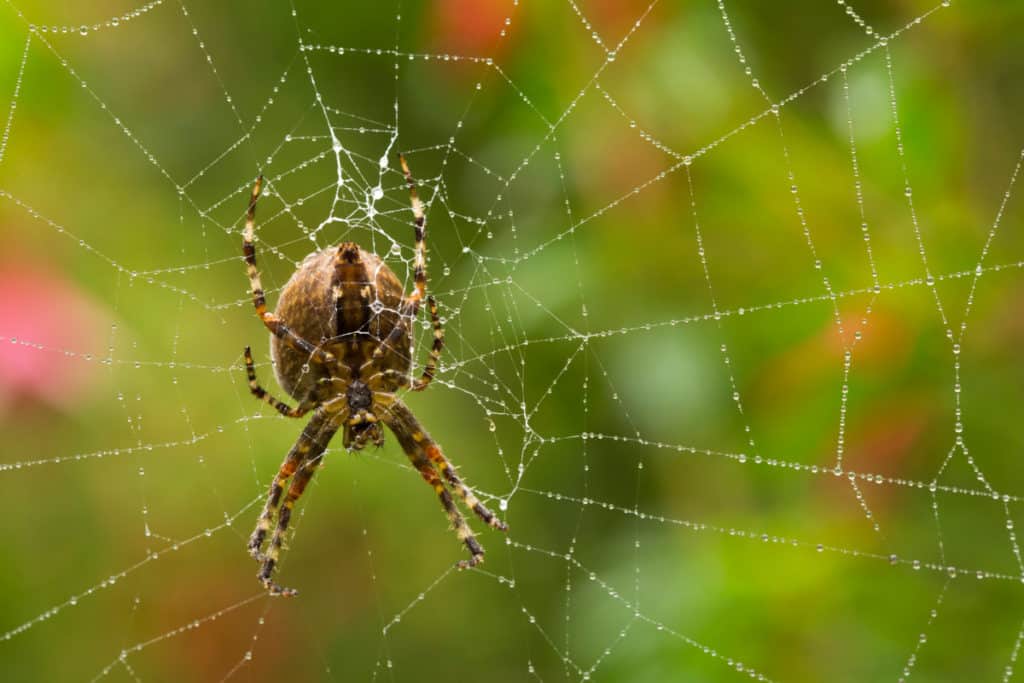
Some species like wolf spiders build underground burrows and tend to sleep in their burrows when they wait for food. The trapdoor spider digs tunnels under the ground and traps its prey through the hinged doors it builds. This species also rests in its burrows.
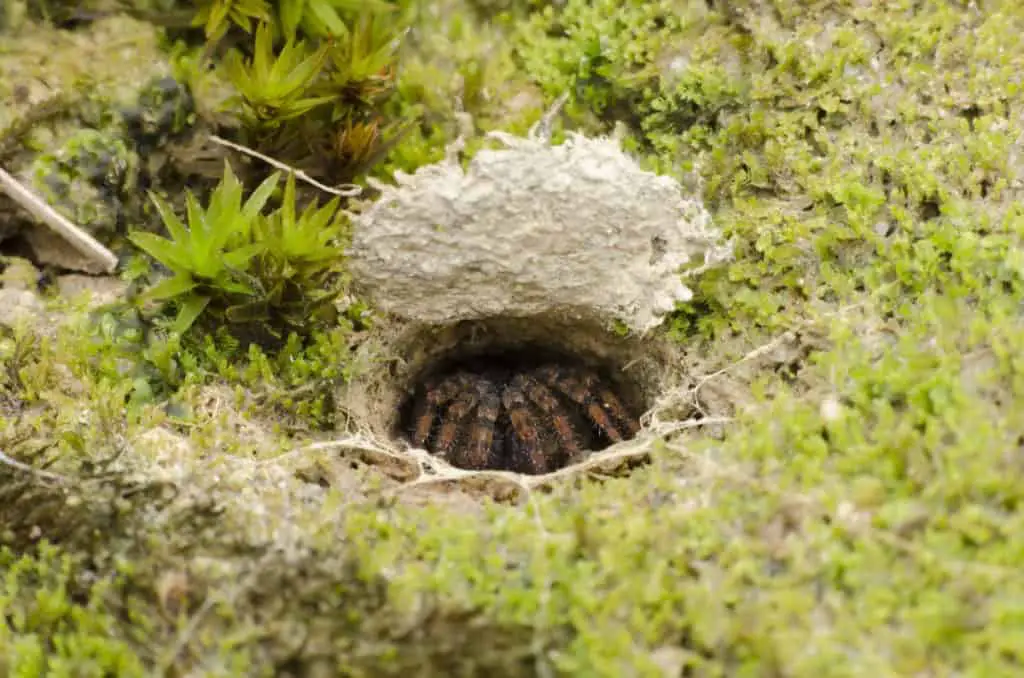
Crab spiders either run after their prey or wait for it to get trapped. So, they can rest while they’re waiting for their prey.
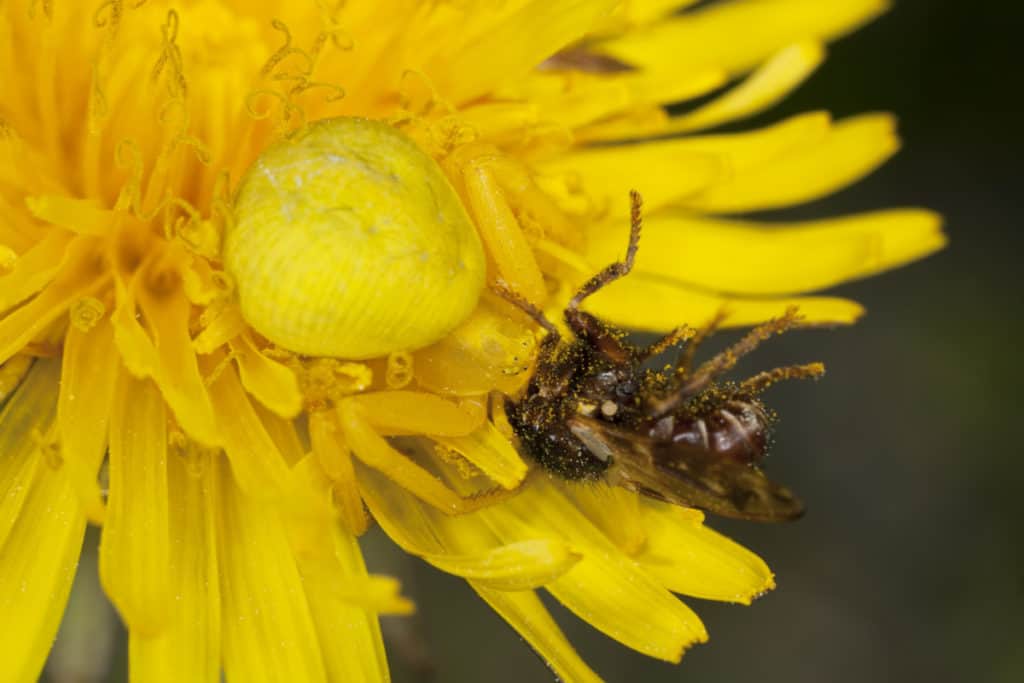
Do Spiders Feel Bored When They’re Inactive?
Staying inactive for such long times may seem boring to us. However, since the spider’s brain isn’t completely shut down while resting, it probably won’t feel bored. Its brain and tactile senses are working to feel the slightest movements. Plus, a spider’s brain isn’t as complex as ours, which means boredom isn’t an issue for them.
Do Spiders Sleep at Specific Times of the Day?
Sleep in all creatures is regulated through the circadian rhythm. It determines what time each creature should go to sleep and when it should wake up. Animals sleep at night or during the day, depending on if they’re nocturnal or diurnal.
Based on their circadian rhythms, most spiders are in a resting state during the day and more alert at night. But if they see prey caught in their web, they won’t wait until nightfall to have their meal. That’s why spiders’ resting and active states aren’t regular the way we expect.
Scientists suggest that spider days could be shorter or longer than 24 hours because of this irregular sleep pattern. For example, some spider species have 19-hour days, and some have 29-hour days.
These short days in some spider species, all nocturnal and web-weaving, make them jet-lagged in the morning. But they don’t seem to mind it as it doesn’t affect their behaviors. When the scientists tried to shorten the spiders’ days in the lab, they adapted quickly within a day.
Researchers believe this adaptation may have helped spiders stay active at night, weave webs, and hunt while avoiding day hunters by dawn.
Do Spiders Sleep During the Day or Night?
Most spider species are nocturnal, so they spend their nights hunting or weaving webs. In addition to being nocturnal, most spiders rest during the day because their hunters, such as birds, are active during the day. This way, they can hide in safe places like wall cracks.
Some species need sunlight to weave their webs because the sun can make the web silk stronger. These species are active during the day. Those spiders who don’t need the UV rays for their silk tend to be nocturnal.
Barn spiders and tarantulas are nocturnal, and some species of wolf spiders are diurnal.
Where Do Spider Sleep?
Telling whether a spider is sleeping, it’s pretty straightforward. If the spider is motionless, it’s resting. But if you move or try to kill it, it’ll quickly run because it’s not sleeping the way you imagine.
Spiders sleep with different postures depending on the species. For example, web-weaving spiders, who are always in the hanging position, can sleep upside down or lie down on their web.
Sometimes, you might see them tucking their legs in to stay warm, but you won’t see them curled up since it’s more a sign of a dead spider than a resting one.
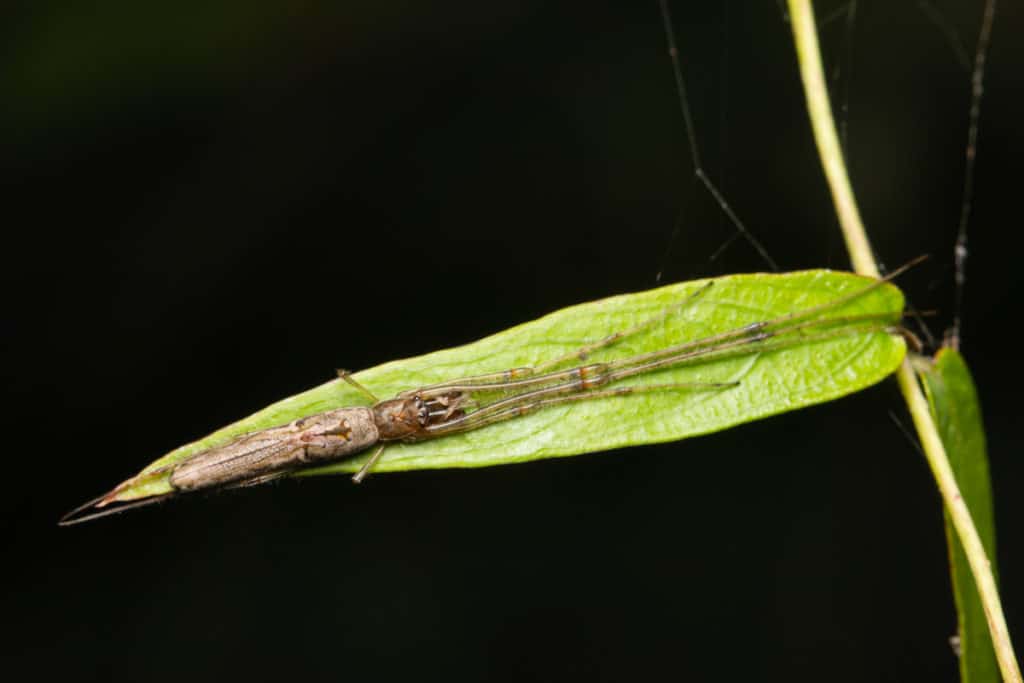
They don’t sleep on their backs, either. If you see a spider lying with tucked legs on its back, it’s most probably dead. That’s because the legs of their exoskeleton need fluid to operate. If spiders are dead they dehydrate and with no fluid in their legs, the legs curl up.
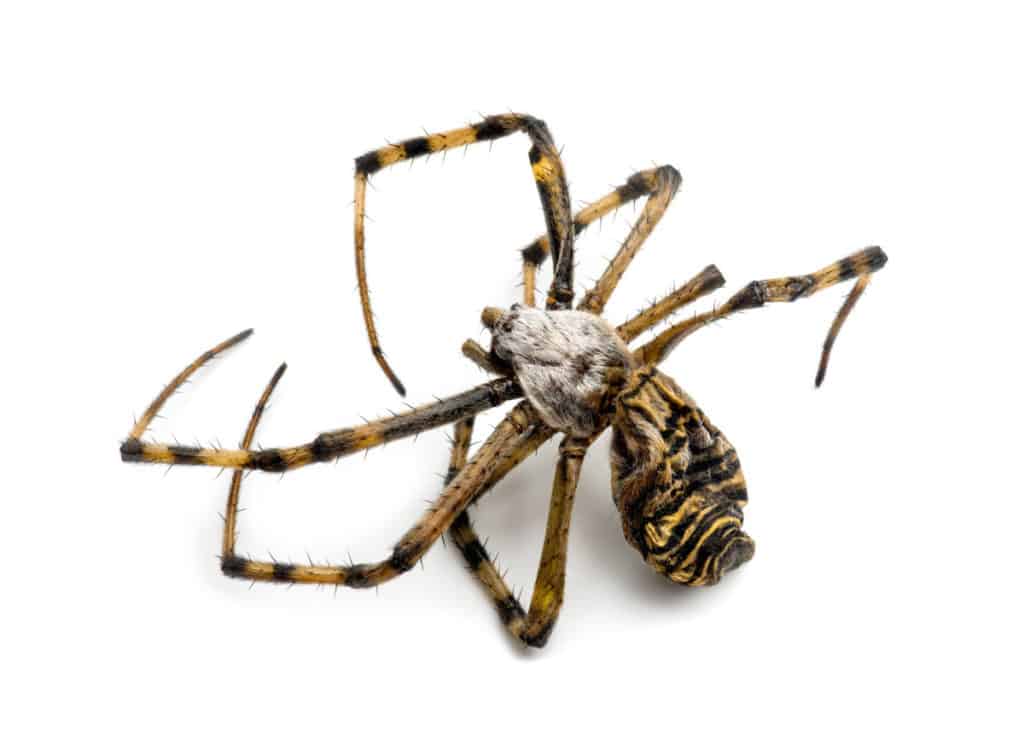
Do Spiders Hibernate During Winter?
Spiders can’t tolerate cold effectively. So they have to go into a state of hibernation during the winter. During hibernation, they find a warm shelter to protect themselves from the cold and lower their metabolism. That’s why you’re most likely to see spiders in your house during the winter.
However, during these resting periods, their brains remain completely active to feel the slightest movement and vibration. So, if an opportunity for a meal springs up, they quickly regain awareness to catch the food.
Some spiders can live for long periods without food. If you are interested check out this article we have written comparing different species of spiders’ ability to survive without food, How Long Can Spiders Live Without Food?
Do Spiders Dream?
Dreaming requires entering the REM state, which is common among mammals, including humans. However, some studies have suggested that dreams don’t have to occur during REM. For example, since honeybees learn during their sleep and experience slow movement stages of sleep, they might dream.
However, since studies on spiders are limited, all we know is that they can’t go into REM sleep as they’re simply resting and not sleeping.
Sleep In Other Creatures
While sleep can put animals in danger against predators, almost all animals have activity-rest cycles and need some sort of sleep. Mammals, fish, birds, amphibians, and reptiles sleep based on day-night patterns called the circadian rhythm.
Interestingly, mammals and birds have stages of REM sleep, like humans. They also compensate for sleep deprivation by sleeping more deeply.
Amphibians and reptiles have similar sleeping patterns to mammals, such as decreased brain activity. They also make up for sleep loss more deeply and don’t wake up easily when they sleep after periods of sleep deprivation.
Although there’s minimal research on sleep in spiders, we know that insects and invertebrates also sleep based on circadian rhythms. For example, honey bees sleep 5–8 hours a day, and they sleep at night because they forage during the day. Sleeping helps them consolidate their navigation memory, and they’ll suffer from cognitive impairment due to lack of sleep.
The same influence has been observed in fruit flies, which perform poorly due to disturbances in their sleep.
How Long Do Animals Sleep?
Sleep duration depends on several factors, including:
● Brain metabolism: The higher the brain metabolism, the more sleep an animal needs. Smaller animals need more sleep than larger ones. For example, elephants, cows, and giraffes sleep less than four hours a day.
● Eating habits: Carnivores sleep more than herbivores. That’s because herbivores need to eat more frequently to gain the same amount of energy.
● Food availability: If animals have to search for food for a long time, they don’t have enough time to sleep. Plus, hunters can sleep more because they don’t need to watch out for predators.
● Age: Newborns need more sleep than adults, especially in mammals, including humans.
We have written some other articles about the sleeping habits of other bugs if you are interested:
Where Do Bumblebees Go At Night?
Sleep in Humans
For humans, sleep is an essential way of recharging the body and the mind. Without it, we can’t think clearly, concentrate, and even react properly to stimuli, like when we’re driving.
Studies have shown that sleep helps us conserve energy by lowering our metabolism, restoring our body cells, and boosting our immune system.
Snoozing helps our brain gets rid of toxins and free radicals and recovers the neurons’ activities. We consolidate our memories during sleep by going through them and reorganizing the information in our heads.
What Happens During Sleep?
Generally speaking, during sleep, physical activity decreases, and responses to outside stimuli decrease. The body gradually falls into a state of unconsciousness.
Sleep involves four stages: three stages of non-rapid eye movement (NREM) and one stage of rapid eye movement (REM).
NREM 1:
During this phase, which lasts several minutes, our body moves from wakefulness to sleep. We breathe more slowly, our muscles relax, and our heart rate, brain waves, and eye movements slow down.
NREM 2:
This stage takes the longest and involves further relaxed muscles and slower heart rates and breathing. The eye movements stop while the brain waves remain slow, and sleep gets deeper.
NREM 3:
Muscles are at their most relaxed state during this stage. Brain activity, heart rate, and breathing are at their minimum. If you can’t reach this stage of sleep, you won’t feel energetic and alert when you wake up.
REM:
Typically, after 90 minutes of sleep, the eyes start to move while breathing, heart rate, and blood pressure will accelerate. REM sleep is where we dream and consolidate our memories.
These four stages repeat periodically while we are asleep, with each period lasting 90-120 minutes. Nearly 75 to 80 percent of each cycle is the NREM stage, and the REM gets longer throughout the night.
The Wrap Up
Spiders don’t experience sleep the way mammals and amphibians do. For one thing, they don’t have eyelids, which makes it difficult for them to experience sleep in the regular sense.
Plus, they have to remain alert should any threat or potential prey approaches. That’s why you might see a resting spider jump quickly with the slightest outside stimuli like a vibration in its web.
During the resting periods, they go into a low-metabolism state, which makes up for the energy they exert on web-weaving and helps them survive if they can’t find food.
Sources
https://www.wpr.org/what-happens-spiders-winter
https://www.apa.org/monitor/2019/01/break-spiders-sidebar
https://animals.howstuffworks.com/arachnids/spider1.htm
https://pestremovalwarrior.com/are-spiders-more-active-at-night/
https://www.sleep.org/do-all-animals-sleep/
https://www.healthline.com/health/why-do-we-sleep
https://www.newscientist.com/article/dn19864-sleepy-bees-slur-their-waggle-dance-moves/
https://www.youtube.com/watch?v=N-m_fQHD8zw
https://www.ncbi.nlm.nih.gov/pmc/articles/PMC3768102/
https://www.ncbi.nlm.nih.gov/pmc/articles/PMC2525690/
https://pubmed.ncbi.nlm.nih.gov/7546322/
https://academic.oup.com/sleep/article/27/4/628/2696931
https://www.newscientist.com/article/dn19864-sleepy-bees-slur-their-waggle-dance-moves/
